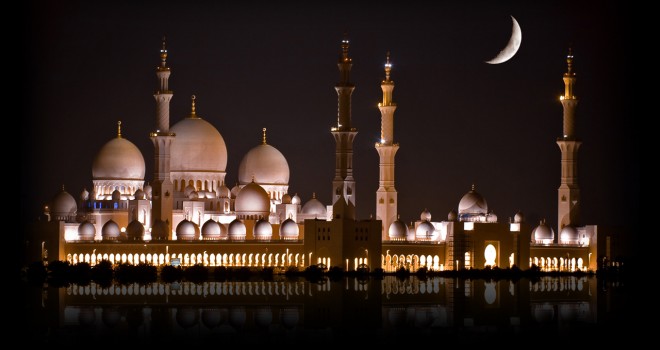
Ramadan in the UAE: Will science replace moon-spotting to start the Holy Month?
ABU DHABI // The wait for the start of Ramadan is always an anxious one. After weeks of guesses and rumours about what the date will be, astronomers haul their telescopes to the highest point in their emirate and watch for the new crescent moon to usher in the Holy Month.
But last week the French Muslim Council voted to do away with that, basing the start of Ramadan on astronomical calculations instead of a physical sighting of the moon.
And scientists say the UAE could soon follow suit. They say it would allow the dates of Ramadan – and Eid – to be fixed many years in advance, making it much easier for Muslims to plan around them.
Dr Nidhal Guessoum, an Algerian astrophysicist at the American University of Sharjah, said the “historic” French vote was “a tremendous first and a real progress”. He said: “There’s a very good chance that by next year, the Turks will call in astronomers and Muslim jurists from Malaysia all the way to the US to come up with recommendations, which I know they will implement.”
Computing the moon’s position is nothing new. The calculations allowing scientists to determine the position of any object in the sky have been known for centuries.
But science is complicated by the tenet of Islam, because they are not in principle based on the moon’s position but on its observation.
“Computer models are able to predict to what probability and certainty we can say the new crescent will be visible from a given region,” Dr Guessoum said.
“Islamic scholars say they haven’t been told to follow any computer model, so there’s a literal versus spirit-of-the-law debate.
“Very often, we cannot tell people when the crescent will be seen at every location, we can tell them by region, from the Arabian Peninsula to North Africa, for instance.”
That poses a major problem. “If the crescent can be seen in Tunisia, do we in the UAE accept that as the start of the month or do we wait?
“All of this is now rather well-known among Muslims … including the Islamic scholarly community.”
But momentum for change is growing. Astronomers and Islamic jurists met in Mecca last year to discuss the issue, and are planning another meeting in Turkey this year.
“The debate is now at another level,” Dr Guessoum said. “Not only are people aware of what science has contributed but there are organised meetings and debates in the classical Muslim world and in the West.”
Although he suspects some countries in the Middle East will shift by next year, others will require more time to adapt. “Other countries will require a lot more education, like Saudi Arabia,” he said.
Dr Guessoum believes countries should make the shift.
“We need to know when Ramadan starts to find out when we should fast, travel to Saudi for the pilgrimage, working hours change,” he said. “There are plenty of implications and we cannot just wait until the last evening before when people start rushing to buy food.”
He said a potential bi-zonal Islamic calendar could be put into place, from the traditional Muslim world – from Malaysia to Morocco – to the rest in the West. “People need to know ahead of time because modern life has changed so much.”
Muslim scholars say it would be hard to make the change binding.
“Starting from the mid-eighth century AH [the 14th century AD], there have been scholars who consider it valid and permissible for individuals to fast based on their own calculations of the lunar months and for individuals who trust their calculations,” said Sheikh Musa Furber, a Mufti and research fellow at the Tabah Foundation in Abu Dhabi.
“They did not consider it among the ways of making fasting obligatory on the community. If a mathematician or astrophysicist says that, by his calculation, Ramadan has started, the governor cannot declare that everyone has to fast. That requires witnessing the new moon or completing the previous month.”
Mr Furber said the French vote would not necessarily affect the Middle East. “I don’t think that France doing this will change things since the best experts have already decided,” he said.
By Caline Malek, published in The National (UAE), May 19th 2013.

